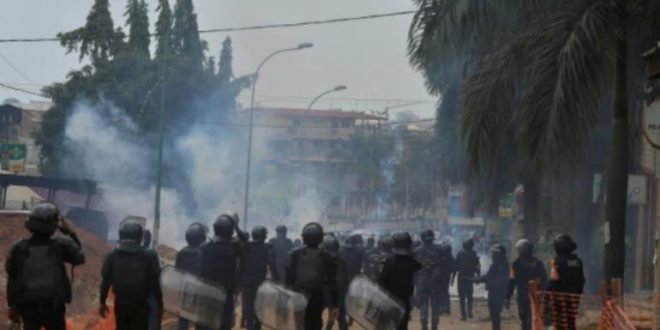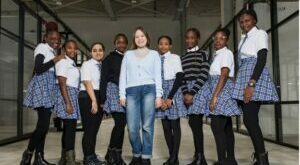Ivory Coast President Alassane Ouattara appealed for calm over Saturday’s election as opponents rejected the ballot after a boycott and scattered protests against his attempt to secure a third term.
Opposition candidates said they dismissed the vote as a failure and an exiled former rebel chief and one-time Ouattara ally said he no longer recognised the Ivorian leader as president.
At least 30 people have been killed in pre-election clashes since August, stoking fears of a repeat of the 2010-2011 crisis that left 3,000 dead when then-president Laurent Gbagbo refused to accept defeat by Ouattara.
Ouattara’s decision to run again angered opponents who called for an “active” boycott and civil disobedience over a third mandate they branded an unconstitutional “electoral coup”.
“I appeal to those who launched this slogan for civil disobedience which has led to deaths: Stop. Ivory Coast needs peace,” Ouattara said.
A former IMF economist in power since 2010, Ouattara is facing off against veteran opposition leader Henri Konan Bedie in a bitter rivalry that has marked the West African country’s politics for decades.
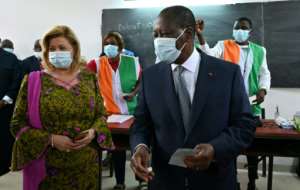 Ivory Coast’s incumbent President Alassane Ouattara (R) has urged opponents to give up protests. By Issouf SANOGO (AFP)
Ivory Coast’s incumbent President Alassane Ouattara (R) has urged opponents to give up protests. By Issouf SANOGO (AFP)
“The electoral coup has been a failure. The Ivorian people succeeded in halting this election,” opposition candidate Pascal Affi N’Guessan told a news conference at Bedie’s residence.
Tweeting from exile, former rebel chief Guillaume Soro, who once gave Ouattara military backing in the 2010 crisis, Ivorians to work towards removing Ouattara.
“I no longer recognise Ouattara as President of the Republic. People of Ivory Coast, we have no other option than to work to remove Ouattara,” Soro wrote on Twitter.
The ballot in French-speaking West Africa’s economic powerhouse is a crunch test in a region where Nigeria is emerging from widespread social protests, Mali faced a coup and jihadist violence wracks the Sahel.
Police earlier fired tear gas in Abidjan’s Blockhauss district to clear hundreds of youths who tried to disrupt voting.
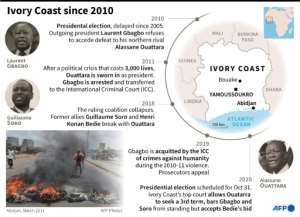 Political upheaval in Ivory Coast since 2010. By Gillian HANDYSIDE (AFP)
Political upheaval in Ivory Coast since 2010. By Gillian HANDYSIDE (AFP)
Groups of youths set up makeshift barricades in and around the central eastern town of Daoukro, a stronghold of Bedie.
“We don’t want Ouattara’s third term. Elections should be postponed,” said protester Eugene Kouakou Kouadio at a barricade of tables and branches, with a slingshot in his hand.
Voting material was damaged and one person injured in the western town of Gboguhe when clashes erupted between pro-Ouattara ethnic Dioula youth and local Guere communities, said a local paramedic.
In Bouadikro and Bongouanou, a stronghold of opposition leader N’Guessan, north of Abidjan, polling stations had also not opened.
More than 35,000 police and security force officials were mobilised to secure the election.
Electoral authorities by law have up to five days to announce the results.
Growth, stability
Ouattara, 78, was supposed to step aside after his second term to make way for a younger generation, but the sudden death of his chosen successor led to a change of plan.
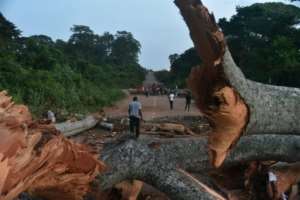 Protesters blocked roads in the opposition stronghold of Daoukro. By SIA KAMBOU (AFP)
Protesters blocked roads in the opposition stronghold of Daoukro. By SIA KAMBOU (AFP)
The Ivorian leader says a constitutional court ruling approved his third term, allowing him to bypass the country’s two-term presidential limit after a 2016 legal reform.
His supporters expect a strong win, touting his record in bringing infrastructure projects, economic growth and stability to the world’s top cocoa producer after a decade of instability.
But Bedie, 86, and other opposition leaders accuse the electoral commission and the constitutional court of favouring the government, making a fair and transparent vote impossible.
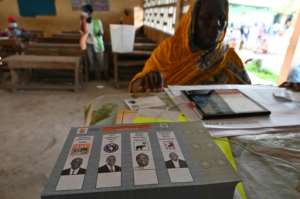 Weeks before the election saw sporadic clashes in the south of the country. By Issouf SANOGO (AFP)
Weeks before the election saw sporadic clashes in the south of the country. By Issouf SANOGO (AFP)
The weeks before the election saw sporadic clashes in the south of the country, mainly between local ethnic groups close to the opposition and Dioula communities seen as loyal to the president, himself a Muslim from the north.
The country’s political feuds are often closely tied up with its leaders’ ethnic identities and regional loyalties.
A decade ago, Ivory Coast was emerging from a civil war and the country was split in two, the north held by rebels and the south by forces of then president Gbagbo.
Ouattara won a long-postponed election in 2010 although Gbagbo refused to accept defeat. After battles in Abidjan, French forces intervened to help Ouattara loyalists oust the former president.
 Home Of Ghana News Ghana News, Entertainment And More
Home Of Ghana News Ghana News, Entertainment And More
